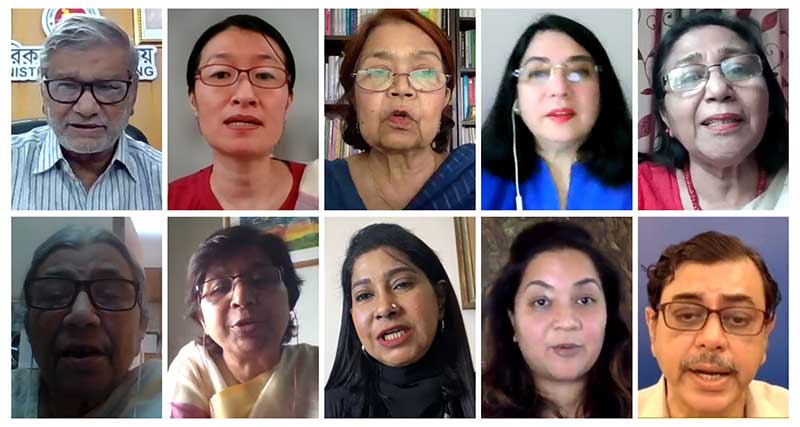
The Government of Bangladesh has aptly rolled out a number of liquidity support and fiscal stimulus packages in response to the COVID-19 pandemic. However, these packages were not designed with women in mind, and hence have not been entirely successful in addressing women’s special needs during the pandemic. Most women are unaware of the liquidity support, while some are reluctant to apply for loans despite being aware. Due to the economic downturn and the uncertainty regarding the future, women need cash handouts more than loans. Fiscal measures would be more effective in easing the burden of the pandemic on women than monetary measures.
These observations emerged at the CPD’s virtual dialogue titled “Socio-Economic Recovery Measures of the Government: How Much Women Have Benefitted” held on Thursday, 15 April 2021, in partnership with UN Women. CPD has recently undertaken a study on the abovementioned theme in collaboration with UN Women. The findings of the study were shared at the dialogue. This study explores the gender dimension of the government’s COVID-19 policy measures and recommends policies for making the COVID-19 response work for women.
CPD’s Executive Director, Dr Fahmida Khatun made the keynote presentation during the virtual dialogue. She presented some of the highlights from a rapid survey on women entrepreneurs’ access to the stimulus package. In this respect, she focused on a range of issues, such as providing training for women entrepreneurs and improving women’s access to finance. She also pointed out that child marriage, burden of unpaid care and domestic work, and violence against women have increased during the pandemic.
Commenting on the promotion of the incentive package, Chief Guest of the event, Mr M A Mannan, MP, Hon’ble Minister for Planning, Government of Bangladesh said, all should work together to bring this information to the right people. He mentioned the government recognizes the challenges of women during the pandemic and is working towards improving their situation.
Ms Shoko Ishikawa, Country Representative, UN Women Bangladesh Country Office joined the dialogue as a Special Guest and focused on the global picture of women due to pandemic. She mentioned that globally, 47 million women and girls are forced into poverty because of COVID-19. She also added that all packages need to ensure adequate and transparent delivery for women.
Professor Rounaq Jahan, Distinguished Fellow, CPD Chaired the dialogue. She opined that, though COVID-19 added disadvantages for women, a plan of action for specific groups to support in specific areas for women entrepreneurs need to be prepared. A task force might be formed to monitor the progress of this work.
MSMEs are in the informal financial system and their issues cannot be solved unless they are taken to the formal banking/financial channel, said by Dr Lila Rashid, Former Executive Director, Bangladesh Bank. Mr Selim R F Hussain, Managing Director and CEO, BRAC Bank stated that banks should also focus on investing in non-financial advisory services for women entrepreneurs.
Ms Shaheen Anam, Executive Director, Manusher Jonno Foundation; Ms Kaniz Almas, CEO & Managing Director, Persona; Dr Fauzia Moslem, President, Bangladesh Mahila Parishad and Ms Vidiya Amrit Khan, Director, Desh Group of Companies joined the virtual dialogue and delivered their remarks as Distinguished Discussants.
The dialogue was participated by relevant government officials, business leaders, development activists, experts and academia, representatives from the development partners and media professionals.


